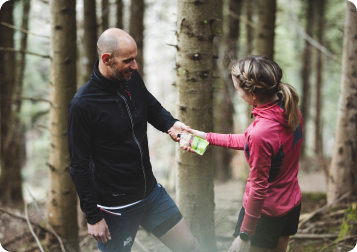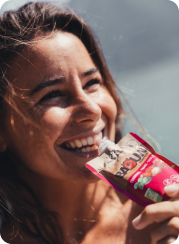After fats and carbohydrates, we now turn to the third major macronutrient family: proteins. In this article, we'll reveal all the secrets and give you all the advice you need to choose and consume the best proteins for your long-term health. Bear in mind that each macronutrient plays a fundamental role in the proper functioning of your body, each with its own missions, particularities and benefits in your balanced diet.
Dans notre démarche éco-responsable, le choix des protéines que nous utilisons dans nos produits est primordial. Chez Baouw, nous avons fait le choix d’utiliser uniquement des protéines végétales dans nos produits. Pourquoi ? Car en plus d’être de très bonnes qualités, elles sont aussi très digestes et contiennent des micronutriments (calcium, magnesium...).
Our mission is always the same at Baouw: to provide you with all the knowledge you need to take full control of your practice and your health.
What are the best sources of protein to eat? How and when should they be consumed? Are all proteins the same? Should they be consumed during exercise?
Thanks to the informed eye of our two experts: Benoit Nave, our leading nutritionist and co-founder of Baouw, and Marion Counil, dietician-nutritionist and seasoned runner, we're going to explain everything to you.
1/ What are proteins?
‘Proteins are the building blocks for many structures in the human body’.
So that you have all the important terms you need to know when talking about proteins, let's take a look at the main principles surrounding this large family of foods.
‘Proteins are made up of essential amino acids that are only provided by food, that are not synthesised endogenously, but exogenously, i.e. provided via food: they are systematically found in animal products and they are distributed in several plants,’ explains Marion.
Benoit poursuit : “Les protéines sont les briques de construction pour de nombreuses structures du corps humain, en particulier nos muscles ainsi que les tissus qui soutiennent nos muscles, les structures osseuses ou encore les structures vasculaires. Les protéines permettent de construire des molécules très importantes pour l’ensemble du fonctionnement du corps, notamment les hormones, dont les neurotransmetteurs comme, la dopamine, l’adrénaline et la sérotonine, interviennent pour réguler nos comportements.”
Animal proteins:
Non-exhaustive list : white meat (chicken, poultry, turkey), red meat (beef), fish (sardines, mackerel, salmon, etc.), eggs, dairy products (fromage frais, hard cheese).
Marion explains: ‘You can be a sportsman and a vegetarian, and therefore not eat meat, but still eat eggs or dairy products. In this case, supplementation is not always necessary, although it is worth carrying out a blood test to check for any deficiencies and prevent the appearance of various symptoms linked to a protein deficit, such as general fatigue or a pronounced sweet tooth. According to the WHO, the recommendation is one portion of red meat every 10 days, one portion of white meat 2 to 3 times a week, and the same for fish. Eggs remain the benchmark protein in terms of digestibility and assimilation (99% with the runny yolk and well-cooked white) and can be eaten every day’.
For Benoît, meat and animal proteins are not problematic in themselves, what is problematic is the way they are produced.
"Over and above its origin, animal or vegetable, the quality of the protein will strongly depend on the way it has been produced. If we take the example of beef, beef produced by intensive farming will consume a lot of water and cereal products (soya), whereas meat raised on pasture will consume far fewer natural resources. These are opposing production models that do not produce the same quality of product on your plate. In the case of extensive farming, animal proteins are very rich in micronutrients, particularly omega 3 fatty acids.
Plant proteins
Non-exhaustive list: cereals and pseudo-cereals (small spelt, wheat, maize, rice, oats, rye, millet, etc.), pulses (lentils, chickpeas, split peas, amaranth, kidney beans, etc.), fermented soya (tofu, tempeh, etc.), oilseeds (walnuts, hazelnuts, almonds, cashew nuts, etc.).
According to Marion, "when you have a predominantly vegetarian diet, you need to use what we call “complementary protein” during one meal of the day. In other words, combining several plants together. For example, wholegrain or semi-complete rice and lentils. Why wholemeal or semi-complete? To take advantage of the fibre, proteins and minerals present in the germ and bran of the cereal, which are not present in white rice’.
Marion adds, ‘This cereal/legume combination is most often recommended, as it provides 2 very important essential amino acids: methionine in cereals and lysine in legumes. There are foods that contain these 2 essential amino acids: quinoa, buckwheat, amaranth and hemp. Finally, a word of advice: if you want to assimilate plant proteins more effectively, consider soaking them. As you can see, there's a huge range of foods to choose from, so you can vary your tastes and textures. Indulge yourself, the combinations are endless, so don't be afraid to be daring!
Benoit ajoute : “il n’y a pas d’antagonisme entre les protéines animales et végétales, les protéines végétales viennent très souvent compléter leurs homologues animales. Par contre, leur gros avantage est que contrairement à la viande, elles disposent d’un indice PRAL* très avantageux donc plutôt avec un effet alcalinisant sur le corps. Par exemple, à la suite d’un entraînement long, intensif ou traumatisant, ces sources de protéines seront plus intéressantes, car elles vont permettre de tamponner l’acidité générée par l’entraînement.”
PRAL* index: measures the alkalinising or acidifying potential of foods.
2/ Proteins, your daily health allies
‘It's very important and more beneficial to eat protein at the start of the day, from breakfast onwards, to promote the metabolism of neurotransmitters, particularly dopamine’.
Marion explains the correct recommendations: "For an adult, it's advisable to consume 0.8g to 1g per kilo of body weight, rising to 1.6g in various cases: heavy sports load, pregnancy, healing from a serious injury, etc. On average, this corresponds to providing around twenty grams of protein per meal, which could be equivalent to 2 eggs, 150g of tofu, 100g of chicken or 250g of cooked lentils. Today, it is recommended to include a daily protein ratio of 70-80% plant-based and 20-30% animal-based.
Benoit, on the other hand, defends the idea that there are certain times of the day when it's better to give priority to protein consumption. It's called chrononutrition, and he explain all about it.
‘It's very important and more beneficial to provide protein at the start of the day, from breakfast “It is very important and more beneficial to provide protein at the start of the day, from breakfast onwards, in order to promote the metabolism of neurotransmitters, particularly dopamine. This will also ensure that serotonin is secreted in sufficient quantities throughout the day. Protein intake at the start of the day will also promote thyroid metabolism thanks to a particular amino acid: tyrosine. Tyrosine promotes energy synthesis and therefore vitality. For other meals, you should limit your meat intake, particularly as it is difficult for the body to digest meat at this time of day. Instead, opt for lighter proteins such as fish or vegetable proteins’.
3/ Proteins, your long-term performance allies
‘Whatever type of effort you're about to embark on, the protein intake provided by our new protein bars can only have a positive impact on your performance’.
Let's now turn our attention to a rather controversial question that is not yet common sense: are proteins essential for performance and, above all, should you consume them during exercise?
Looking more specifically at sports performance, Benoît's answer is categorical: "There's no particular point in consuming protein for efforts of up to 8-10 hours. For longer efforts, BCAAs (branched-chain amino acids) may be of interest, particularly if there is a long nocturnal part, to modulate melatonin synthesis downwards, with the aim of reducing the feeling of falling asleep during effort. Another benefit is that they prevent the swelling and oedema that could result from a prolonged absence of protein intake’.
Marion explains: ‘You can optimise your recovery with a protein intake after exercise to promote muscle rebuilding, ideally between 30’ and 1 hour after your effort. If you opt for post-workout vegetable proteins, choose brands that pre-germinate the protein to improve digestion, absorption and assimilation, and to avoid intestinal irritation. During exercise, there are as yet no significant studies demonstrating their benefits, even if they do show interesting effects in limiting muscle catabolism during long-duration efforts such as ultra-trail running’.
Benoit concludes, ‘Whatever type of effort you're about to embark on, the protein intake provided by our new protein bars can only have a positive impact on your performance. It's important to choose foods that you enjoy, whether they're high in protein or not, but don't forget to eat what you feel like eating. That's the compromise we're looking for in each of our recipes, combining performance and pleasure.
So how does Baouw work?
As a reminder, Benoit is behind the creation of Baouw products and has made a major contribution to the development of the recipes that are now making your mouth water. They tell you why Baouw uses only vegetable proteins in its products.
"Unlike animal proteins, which are more difficult to use in sports nutrition recipes, plant proteins have a number of advantages: they can be easily incorporated into our recipes, they are varied and tasty, they can be cooked, and they keep very well. They are also alkalinising, so they help to limit the acidification of the body during exercise and maintain the acid-base balance. This will also allow vegans and those who wish to reduce their consumption of animal proteins to use nutrition products that are solely plant-based."
As you'll have realised, protein intake in your daily routine is essential if you want to aim for full health. That's why Baouw offers a complete range of barres protéinées avec des produits 100% d'origine naturelle et BIO, made mainly from oilseeds, pumpkin seed protein and extra virgin olive oil. A perfect alternative to the protein products currently on the market, most of which use proteins from the other side of the world..
On our website you'll find 3 new tasty recipes specially designed for performance and recovery: Chocolate - Peanuts / - Cashew / - Cinnamon.
Pourquoi utiliser la protéine de graine de courge ? “Car, au-delà du fait qu’elle soit cultivée en Europe et non en Chine comme la grande majorité des autres protéines sur le marché, elle contribue au fonctionnement normal du système immunitaire et réduit la fatigue grâce à sa teneur en fer” se félicite Benoît.
As well as advice from our two experts, we've got a true or false on protein to break down the myths!
‘THAT OUR PROTEIN BAR IS ORGANIC IS FUNDAMENTAL’: TRUE
Choisir une barre protéinée bio, c’est se mettre à l’abri de consommer les produits chimiques ou autres ingrédients transformés qui viennent agrémenter la plupart des barres protéinées du marché. Notre barre protéinée se trouve en adéquation avec notre philosophie : la plus brute et le plus sélective possible dans le choix des aliments ultra-premium qui la composent. Comme tous nos produits, elle se veut sans gluten, sans lait et sans céréales.
‘PROTEIN HAS NEVER BEEN SO TRENDY’: TRUE
FANNY: ‘There's clearly a hype around protein thanks to opinion leaders and experts - mainly nutritionists, influencers and athletes - who are constantly extolling its virtues, particularly for rebuilding muscle after exercise. And there are some very objective figures to back this up: studies predict that plant protein consumption will grow by over 40% between now and 2030!
‘PROTEIN IS ONLY FOR MUSCLE REGENERATION’: NOT TRUE
BENOIT: ‘It's true that nowadays we quite rightly recommend consuming protein after exercise. Through sporting activity, you give the body a construction message, as if it were building a house, but to do that, it still needs bricks... And those bricks are the amino acids that make up proteins. However, to limit the protein to this function alone would be highly simplistic. Protein also plays a crucial role in the effectiveness of the neurotransmitters that regulate moods, sleep cycles, motivation and the ability to control one's determination... Finally, it is the source of a strong immune system and therefore of a healthy person.
FANNY: ‘PROTEINS ARE LESS IMPORTANT IN OUTDOOR SPORTS’: FALSE
FANNY: ‘It's true that, for a long time, proteins were associated with bodybuilding, fitness and other forms of bodybuilding. However, our experts, including Benoit, have proved that the ‘strength’ aspect is a decisive factor when it comes to performance in endurance sports. In simple terms, protein helps to increase strength endurance, i.e. the muscle's ability to run or cycle to its full potential in long events such as trail running, ultra-trail running or cycling’.
‘PROTEIN HELPS YOU GET SHARPER’: TRUE
On entend régulièrement que les protéines assèchent : oui, dans une certaine mesure, cela est vrai. Pourquoi ? D’abord car la protéine provoque un phénomène de satiété assez instantané, purement métabolique. Vous aurez faim une petite heure seulement après un petit-déjeuner composé de céréales, mais pas après deux œufs et quelques fruits.
‘ALL PROTEINS ARE THE SAME’: FALSE
BENOIT: ‘Each protein has its own assimilation index. This refers to the percentage of the protein ingested that is actually assimilated by the body and used in the form of amino acids. It is a sort of quality index for each protein. It should be noted, however, that their composition is also part of their uniqueness. Not all proteins contain the 8 essential amino acids. So not all proteins are the same!
‘PROTEIN BARS CAN ONLY BE EATEN AFTER EXERCISE’: FALSE
BENOIT: ‘It's true that our protein bar has a real role to play in the muscle rebuilding process that takes place after exercise. But its usefulness doesn't stop there. I recommend consuming it after a session, obviously, but also on certain long outings that can last several hours, as it has a reasonable carbohydrate content. Finally, although I attach fundamental importance to meals as structuring rituals in a person's daily life, our protein bar can act as an appetite suppressant or ideal snack if you haven't had time for breakfast or anything else. It's a healthy and tasty alternative if you have no choice but to miss a meal’.
ou now have a wealth of information in your nutrition box to help you make protein your ally in everyday life and in your performance.
Would you like to find out more about sports nutrition and take charge of your health? Check out our dedicated articles!















